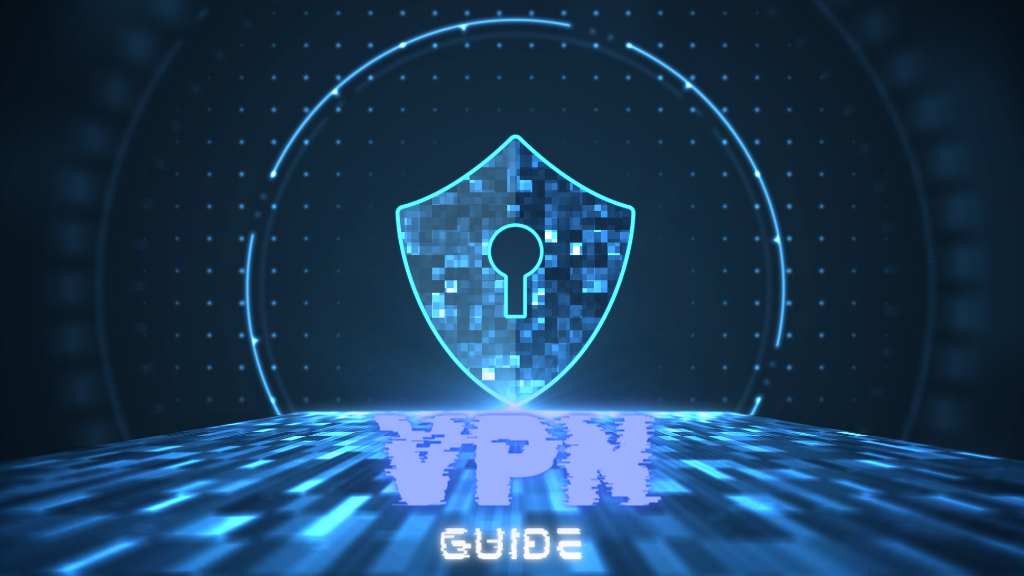In today’s digital age, where online privacy and security are paramount concerns, the use of Virtual Private Networks (VPNs) has become increasingly indispensable. From shielding sensitive data to accessing restricted content, VPNs offer a gateway to a safer and more open internet experience. In this comprehensive guide, we delve into the world of VPNs, exploring their benefits, functionality, and how to navigate the vast landscape of providers. Join us as we embark on a journey to unlock the full potential of VPN technology and take control of your online prese
1. Introduction to VPN (Virtual Private Network):
In an era where digital privacy is at a premium, Virtual Private Networks (VPNs) emerge as essential tools for safeguarding online activities. At its core, a VPN establishes a secure, encrypted connection over the internet, effectively creating a private network from a public internet connection. This encryption process ensures that data transmitted between a user’s device and the VPN server remains confidential and protected from prying eyes. By routing internet traffic through encrypted tunnels, VPNs shield users from various threats, including hackers, government surveillance, and data interception by Internet Service Providers (ISPs). Whether you’re browsing the web from a bustling coffee shop or accessing sensitive business information remotely, a VPN serves as a digital shield, fortifying your online presence against potential vulnerabilities.
2. Privacy and Security Benefits:
One of the foremost advantages of using a VPN lies in its ability to bolster online privacy and security. By encrypting internet traffic, VPNs create a secure tunnel that shields users’ data from interception. This encryption mechanism ensures that even if data packets are intercepted, they appear as gibberish to unauthorized parties, safeguarding sensitive information such as passwords, credit card details, and personal communications. Moreover, VPNs obscure users’ IP addresses, making it challenging for websites, advertisers, and malicious actors to track their online activities and identify their physical location. Whether you’re conducting online banking transactions, communicating with colleagues, or browsing anonymously, a VPN provides an invaluable layer of defense against cyber threats and invasive surveillance practices.
3. Accessing Restricted Content:
VPNs serve as powerful tools for circumventing geo-restrictions and accessing content that may be blocked or limited based on geographical location. By connecting to VPN servers located in different countries, users can effectively mask their true IP addresses and appear as if they’re browsing from another location. This enables access to region-locked websites, streaming services, social media platforms, and online gaming servers that may otherwise be unavailable in their current location. Whether it’s streaming your favorite TV shows and movies, accessing news websites, or engaging in online gaming with friends from around the world, a VPN empowers users to break through digital barriers and enjoy unrestricted access to global content.
4. Types of VPN Protocols:
Understanding the various VPN protocols is crucial for optimizing security, speed, and compatibility with different devices. Several protocols are commonly used in VPN services, each with its own strengths and weaknesses. OpenVPN, for example, is renowned for its robust security features and flexibility across multiple platforms, making it a popular choice among users. L2TP/IPsec combines the advantages of Layer 2 Tunneling Protocol (L2TP) for data transmission and Internet Protocol Security (IPsec) for encryption, offering enhanced security but potentially sacrificing some speed. IKEv2/IPsec is lauded for its stability and quick reconnection capabilities, making it ideal for mobile devices that frequently switch between networks. SSTP (Secure Socket Tunneling Protocol) is integrated into Windows operating systems and provides reliable encryption but may have limited compatibility with other platforms. Additionally, emerging protocols like WireGuard are gaining traction for their lightweight design and superior performance. By understanding the characteristics of each protocol, users can select the most suitable option based on their specific needs for security, speed, and device compatibility.
5. Choosing the Right VPN Provider:
Selecting a reliable VPN provider is essential for ensuring optimal performance, security, and privacy protection. With a plethora of options available in the market, it’s crucial to consider several factors before making a decision. Firstly, users should evaluate the provider’s encryption standards and protocols to ensure robust protection against cyber threats. Additionally, examining the provider’s logging policy is imperative, as some VPNs may store user activity logs, potentially compromising privacy. Users should also assess the provider’s server network, considering factors such as server locations, capacity, and speed. Moreover, pricing and subscription plans should be compared to determine the best value for money without sacrificing quality. Lastly, user reviews and independent assessments can offer valuable insights into the reliability and reputation of VPN providers. By conducting thorough research and due diligence, users can confidently select a VPN provider that aligns with their security and privacy requirements.
6. Setting Up and Using a VPN:
Once a VPN provider is chosen, the next step is to set up and configure the VPN on various devices for seamless usage. Most VPN providers offer user-friendly applications for popular operating systems such as Windows, macOS, iOS, and Android, simplifying the setup process. Typically, users need to download and install the VPN app from the provider’s website or respective app store. Upon installation, users are prompted to log in to their VPN accounts and choose a server location from the provider’s network. Additionally, advanced settings such as protocol selection, automatic connection options, and kill switch functionality may be available for customization. For users who prefer manual setup, VPN configurations can be manually configured on devices such as routers, providing VPN protection for all connected devices in a home or office network. Once configured, users can seamlessly connect to VPN servers with a single click or tap, ensuring encrypted internet traffic and enhanced privacy protection across all online activities.
7. VPN Performance and Speed:
While VPNs offer significant privacy and security benefits, their performance can vary depending on factors such as server location, network congestion, and encryption protocols. It’s essential for users to consider the impact of VPNs on internet speed when choosing a provider and configuring settings. In general, connecting to VPN servers closer to the user’s physical location tends to result in faster connection speeds due to reduced latency. Additionally, selecting VPN protocols optimized for speed, such as IKEv2/IPsec or WireGuard, can help mitigate potential slowdowns. However, it’s important to note that encryption overhead can still cause some reduction in speed compared to direct internet connections. Users can conduct speed tests before and after connecting to a VPN to assess the impact on performance and make necessary adjustments to optimize speed. Furthermore, VPN providers may offer features such as split tunneling, which allows users to route only specific traffic through the VPN while accessing other content directly, potentially improving overall internet speed. By understanding the factors influencing VPN performance and implementing best practices, users can strike a balance between privacy protection and internet speed for an optimal online experience.
8. Potential Drawbacks and Limitations:
While VPNs offer numerous benefits, it’s essential to acknowledge their potential drawbacks and limitations. One common concern is the possibility of reduced internet speed when using a VPN, particularly during peak usage times or when connecting to servers located far away. Additionally, certain websites and online services may detect and block VPN traffic, limiting access to content or requiring additional verification steps. Moreover, some VPN providers may impose data caps or bandwidth limitations on their free or lower-tier plans, restricting usage for activities such as streaming or large file downloads. Users should also be aware that VPNs do not provide complete anonymity, as VPN providers may still have access to user activity logs, and government agencies may compel providers to disclose user information under certain circumstances. Furthermore, while VPNs can help bypass geo-restrictions, engaging in illegal activities such as copyright infringement or hacking through VPN connections is unethical and may have legal consequences. By understanding these limitations and exercising caution, users can effectively navigate the complexities of VPN usage and maximize their benefits while minimizing risks.
9. Legal and Ethical Considerations:
As users embrace VPN technology to enhance privacy and access online content, it’s essential to understand the legal and ethical implications associated with VPN usage. While VPNs themselves are legal in most jurisdictions, their use for illegal activities remains a contentious issue. Users should familiarize themselves with the laws and regulations governing VPN usage in their respective countries to avoid running afoul of the law. Additionally, it’s crucial to respect the terms of service of online platforms and refrain from using VPNs to circumvent legitimate restrictions or engage in unauthorized activities. Users should also be aware of ethical considerations related to VPN usage, including the potential impact on content creators and service providers. While VPNs can help bypass geo-restrictions and access content from around the world, supporting content creators through legal means such as purchasing subscriptions or licenses is essential for sustaining creative industries. By exercising legal and ethical responsibility in VPN usage, users can enjoy the benefits of enhanced privacy and access while contributing to a fair and transparent online ecosystem.
10. Future Trends and Developments:
The landscape of VPN technology continues to evolve rapidly, driven by advancements in encryption, network infrastructure, and user demands. One notable trend is the growing emphasis on privacy-focused VPN services that prioritize zero-logging policies and enhanced security features to safeguard user data. Additionally, there is a rising demand for VPN solutions tailored to specific use cases, such as gaming VPNs optimized for low latency and high-speed connections, or business VPNs designed to meet the security and compliance needs of enterprises. Moreover, emerging technologies such as blockchain and decentralized VPNs (dVPN) are gaining attention for their potential to decentralize VPN infrastructure and provide enhanced privacy and security through peer-to-peer networks. As internet censorship and surveillance practices continue to escalate globally, VPNs are poised to play an increasingly critical role in preserving online freedom and protecting digital rights. By staying abreast of these trends and developments, users can anticipate future challenges and opportunities in the ever-evolving landscape of VPN technology.
11. Conclusion:
In conclusion, Virtual Private Networks (VPNs) serve as indispensable tools for safeguarding online privacy, enhancing security, and accessing restricted content in today’s digital age. From encrypting internet traffic to bypassing geo-restrictions, VPNs empower users to take control of their online presence and enjoy a safer, more open internet experience. However, it’s crucial for users to choose reputable VPN providers, understand the limitations and legal considerations associated with VPN usage, and stay informed about emerging trends and developments in VPN technology. By incorporating VPNs into their online security practices and adopting responsible usage habits, users can navigate the complexities of the digital world with confidence and peace of mind. Let’s continue to harness the power of VPN technology to safeguard our privacy, protect our digital rights, and preserve the principles of a free and open internet for generations to come.




